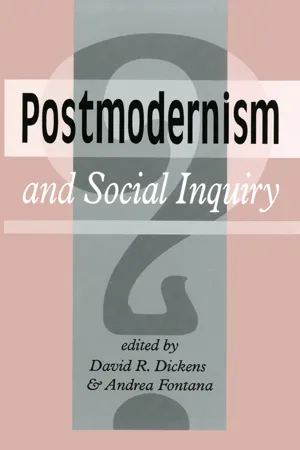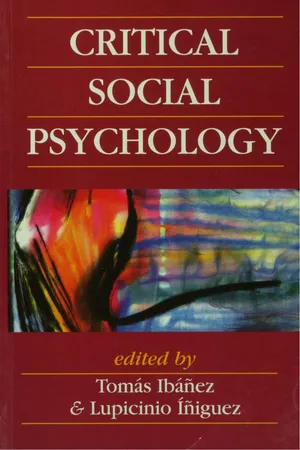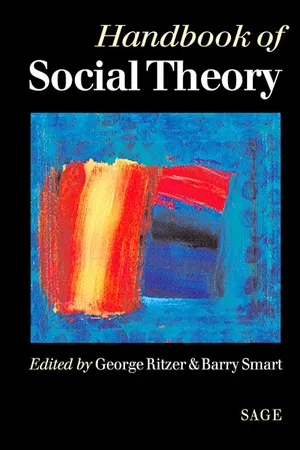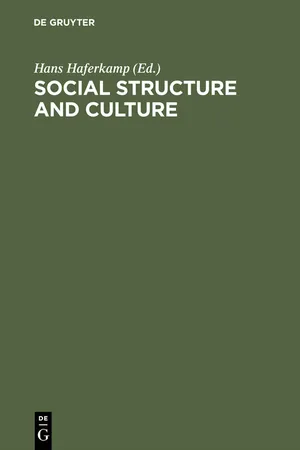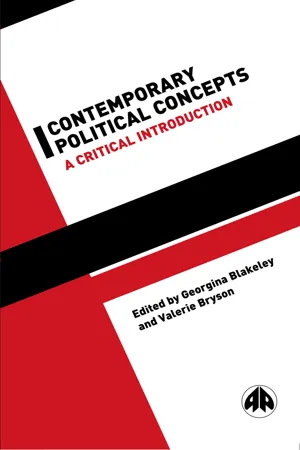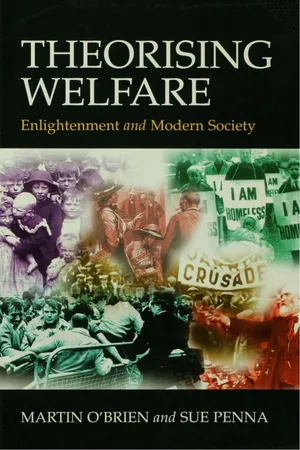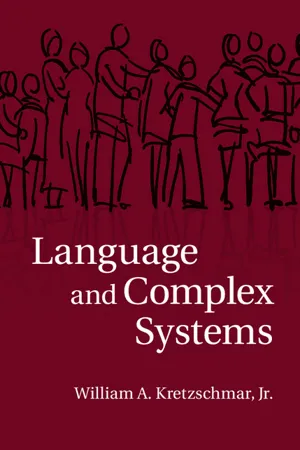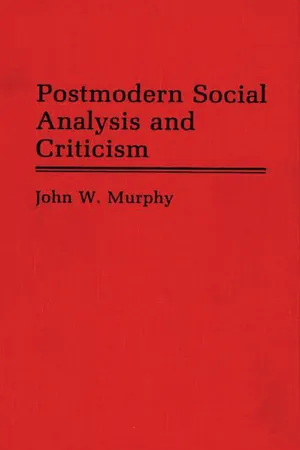Social Sciences
Postmodernism
Postmodernism is a philosophical and cultural movement that emerged in the mid-20th century, challenging traditional notions of truth, identity, and reality. It emphasizes the complexity, diversity, and ambiguity of human experience, rejecting grand narratives and embracing pluralism and skepticism. Postmodernism has had a significant impact on fields such as literature, art, architecture, and sociology.
Written by Perlego with AI-assistance
Related key terms
1 of 5
10 Key excerpts on "Postmodernism"
- eBook - ePub
- David R. Dickens, Andrea Fontana(Authors)
- 2015(Publication Date)
- Routledge(Publisher)
Chapter 1 Postmodernism in the Social Sciences David R. Dickens Andrea FontanaDOI: 10.4324/9780203500347-1Discourse on Postmodernism today occupies a prominent place in a variety of intellectual disciplines within the contemporary arts, humanities, and social sciences. Obtaining a clear-cut, common definition of the term has proven to be extremely difficult, however, not only because of its interdisciplinary applications but also due to its diverse origins. The first instances of the postmodern concept are found in art and literature. In the earliest usage unearthed thus far, around 1870 an English painter, John Watkins Chapman, described as “postmodern” painting that was supposedly more modern than French impressionism (Best and Kellner 1991 ). The concept was similarly employed in literature in 1934 and again in 1942 to describe a related tendency in Hispanic poetry (Hassan 1987) .In a somewhat different context, Postmodernism was used as a sociohistorical concept in a number of books and essays published from 1917 to the 1960s to describe a new era of Western civilization (see Huyssen 1984 ; Best and Kellner 1991 ). Although the authors differed in terms of their evaluations of the new postmodern epoch, they all agreed that its emergence would have profound consequences for contemporary social life. C. Wright Mills, for example, claimed that “our basic definitions of society and of self are being overtaken by new realities” and that “too many of our explanations are derived from the great historical transition from the Medieval to the Modern Age” (1959, p. 166).The third, and most recent, source of origin for current usages of Postmodernism is located in a series of exchanges among American literary and cultural critics in the early 1960s concerning the nature of new artistic and literary styles. Some of these critics, most notably Irving Howe and Harry Levin, lamented the passing of modernist art and literature while others, such as Susan Sontag, Leslie Fiedler, and Ihab Hassan, celebrated the new postmodern literature and art as liberation from the stuffy, elitist canons of aesthetic modernism (Huyssen 1984 - eBook - PDF
- Tomás Ibáñez, Lupicinio Íñiguez, Tomás Ibáñez, Lupicinio Íñiguez, Tomas Ibanez, Lupicinio Iniguez(Authors)
- 1997(Publication Date)
- SAGE Publications Ltd(Publisher)
7 Postmodernis m, Postmodernity and Social Psychology Martin Roiser Postmodernism has gained a certain currency in recent decades, as a culture, a philosophy and a theory of society. In areas of culture, such as writ ing, architecture, art and photography, there has dev eloped a tendency to mix styles, to indulge in reference and quotation, to replace progress with nostalgia, and to confound creation and crit ic ism. Associated with these trends has been the emergence within academic circles of post-struc turalis t philosoph ies which have advanced chal lenging ideas about the interpre ta tion of text, the power of discourse and the nature of subjectivity. On the basis of these and by reference to trends in Western polit ical economy over the last twenty years, such as the declin e of heavy industry, the growth of media and the end of the Cold War, it has been suggested tha t the modern period. lasting from the enlightenment to the recent past, has now given way to an era of new times or postmodernity. From these philosoph ical and sociologica l ideas has em erged a strenuous crit ique of science. According to this the social and natural sciences are mer ely aspects of the 'failed project of modernism', which should now be discarded in the new age. Science is seen as only one of many narratives, which may be deconstructed like any other discourse. If more than a few of these ideas are of any substance, then they have very serious implicat ions for social psychology. The ideas of postmodern philosophy suggest that social psychology should move its focus away from the person towards the interpre ting of discourse and tex t. They suggest tha t the history and methodology of psychology are merely a product of the ideology of modernism and its 'rhetoric of truth'. At tempts to define and practise 'scient if ic' social psychology are therefor e misguided. The use of techniqu es like the questionna ire and the experiment should be discarded on principle. - eBook - PDF
- George Ritzer, Barry Smart, George Ritzer, Barry Smart(Authors)
- 2001(Publication Date)
- SAGE Publications Ltd(Publisher)
24 Social Theory and the Postmodern S T E P H E N C R O O K Introduction The idea of the postmodern is no longer a novelty in social theory. Themes that had been the recondite concerns of an avant-garde in the 1980s and exploded into an intellectual craze-cum-publishing bonanza in the early 1990s are now part of the standard repertoire of social theory and cognate disciplines. Undergraduate students in cultural studies and sociology learn to distinguish the postmodern from other theor-etical ‘frameworks’ or ‘perspectives’, ably assisted by the textbooks, readers and websites now available. At the same time, the idea of the postmodern sits at the heart of contemporary ‘culture wars’, where it is attacked variously as the bearer of cognitive relativism, ethical nihilism, political quietism, aesthetic triviality and historical anachronism, The question arises, now that the postmodern has become both such a familiar and such a contentious part of the intellectual landscape, of how we should assess its significance for social theory. The assessment developed in this chapter can be summarized in four linked propositions. 1 Themes strongly associated with the post-modern are now inescapable problems and resources for any serious attempt to engage theoretically (or empirically) with the con-temporary social world. To that degree, social theory cannot ignore or reject the postmodern while retaining its salience. 2 Despite this, the modern–postmodern con-trast remains troublesome. Clear formal or historical ruptures between modern and postmodern are difficult to draw and to defend, producing obvious anomalies. Claims for distinctively postmodern analytic procedures, poltical strategies or social forms often – and paradoxically – turn on the surreptitious borrowing of modern tropes. 3 Social theory requires an orientation to the postmodern that refuses the caricatures of modern and postmodern that have domi-nated recent culture wars. - eBook - ePub
Subject to Ourselves
An Introduction to Freud, Psychoanalysis, and Social Theory
- Anthony Elliott(Author)
- 2015(Publication Date)
- Routledge(Publisher)
sensitivity to difference : involvement without classification, heterogeneity without hierarchy. Instead, reasoning becomes equated with the principle of equivalence; thinking is shifted from the idea of a central rationality of knowledge to a local processing of ‘difference’, with the experience of oscillation and disorientation to the fore. In this new cultural setting, experience is marked by plurality and multiplicity; the holding together of complex, contradictory images and signifiers, without the pressure or demand for a closure of horizons.To put it in a different way, the postmodern world-view entails a radical dissection of the notion of normativity. The attempt to prescribe ideal norms as an objective ground for truth or meaning is deconstructed as a conservative, modernist desire for the universalization of order and hierarchy. The main objection here concerns the profoundly anti-democratic tendency of thinking society as unilinear; a centralization of power which ruthlessly excludes any difference or opposition of local rationalities and identities in the name of progress (as can be gleaned from even the most cursory glance at the history of colonialism and imperialism in the twentieth century). The postmodern sensibility, by contrast, refuses to engage in any such rationalistic foreclosure of conflict and contradiction in the contemporary political world. On the contrary, postmodernity marks an opening up of sites of contestation, all the way from the divisions of gender and sexuality to issues of democracy and citizenship rights. The wave of ‘particularism’ that has swept over social theory and philosophy of late is wedded to precisely such a political understanding of democratic contestation.‘Long live heterogeneity!’: this might well be the rallying cry of politics in the postmodern. There is, however, a deeper political irony in this underwriting of difference and otherness. On the one hand, postmodernity enters into an egalitarian compact with politics, marked as it is by an ability to reflect back difference and multiplicity, and thus to destabilize the ordered, hierarchical domains of expert knowledge in the contemporary world. On the other hand, however, this valorization of difference is often achieved only at the expense of value , of the disconnection between meaning and human social relationships. The irony, then, is that postmodern culture comes to have less and less time for the differences it fosters. The emotional processing of experience, this would suggest, cannot be adequately performed. In Bion’s terms, this amounts to saying that postmodernity is a culture which notices the sheer amount of experience, or information, available; but, crucially, subjects are unable to think about it long enough to be socially useful. A volatile containing situation might thus be said to haunt the field of the postmodern, and it is perhaps for this reason that much of postmodernist culture is firmly discarding. Such forms of anti-thought can be given powerful connotations at the level of contemporary theory: the end of history, the death of the subject, the reductive conflation of reasoning and logic with totalization, and the demise of the ethical accompanied by the fashionable imperative of ‘anything goes’. Viewed as a kind of postmodern dreaming state, such pessimism can be said to encode powerful feelings of hatred and despair. As Paul Hoggett comments on the negativity of this vision of the postmodern: ‘It is the fantasy of an exhausted breast with nothing left to give and, at this deeper level, the abandonment of hope.’24 - eBook - PDF
- Gill Palmer, Stewart Clegg(Authors)
- 2017(Publication Date)
- De Gruyter(Publisher)
The reference to the postmodern is prompted by an article by Professor Antho-ny Giddens in the same issue which discusses the drift from modernity, a set of ideas, values and institutions firmly anchored by an organizing reason, to postmodernity which implies a dissolution of these scientific and cultural forms. The reflexivity demanded by this transformation may come more easily to the social sciences with their less determinate and more ambiguous knowledge than to the natural sciences more deeply attached to objective, that is context-free, truths, or even the humanities with their instinctive commitment to notions of culture, worth and discrimina-tion ( The Times Higher Education Supplement, January 17, 1992: 12). The matter could not be put with more clarity. The Times Higher Education Sup-plement elaborates its characterization of the contemporary social science scene further. Social science, it suggests, is today characterized by a reflexivity ar-guably superior to the more restricted scientism... once espoused which takes it beyond the old frontiers of modernity, a reflexivity marked by a populism, a lack of respect for academic propriety, a celebration of 'enterprise'(77ie Times Higher Education Supplement, January 17, 1992: 12). A position combining reflexivity and a lack of respect for academic propriety is one that I take to be an admirable point of departure. That it can also claim enterprise is an additional bonus. In gaining one's bearings, some terms newly central await definition (Giddens 1992: 21). First, there is modernity, that cluster of social, economic and politi-cal systems brought into being in the West from somewhere around the 18th centu-ry onwards. Postmodernity, by extrapolation thus refers to the incipient or ac-tual dissolution of those social forms. Both modernity and postmodernity should be differentiated from modernism and Postmodernism. - eBook - PDF
- Hans Haferkamp(Author)
- 2017(Publication Date)
- De Gruyter(Publisher)
A further implication of a postmodern sociology would be to emphasize not only the end of the social but also the end of history. The account of Postmodernism presented by Vattimo (1985) emphasizes that postmodern is not just to be conceived as signifying a historical break that points to a move beyond modernity. Postmodernism involves the notions of a postmetaphysical and postmodern epoch, with the rejection of the modernist idea of historical development, or a unifying point of view that can be imposed upon history. In effect there has always already been the end of history; it is only now that we can recognize and accept it. Postmodernism's critique and rejection of the meta-narratives of modernity (science, religion, philosophy, humanism, socialism, feminism, etc.), all of which seek to impose some sense of coherence and cogency onto history, directs us away from universalizations toward the particularity of local knowledge. This is a shift that is advocated on a theoretical level via arguments that build on the work of Nietzsche, Heidegger, and Derrida; yet this advocated theoretical shift itself may well have come to the fore at a particular moment in time and therefore should be symbiotically related to what is regarded as a more general dehistoricization of experience that is taking place within contemporary consumer culture, which also undercuts universalizations and the sense of ordered narrativity on the everyday level through its accentuation of a multifaceted and ever-changing present. The questions we face in trying to understand postmodern culture sociologi-cally, therefore, revolve around understanding how these two aspects: The production and circulation of postmodern theories (many of which have a sense of end of history, albeit nontragic finality, about them) and the wider production and circulation of everyday postmodern cultural experiences and practices are related. - eBook - PDF
Contemporary Political Concepts
A Critical Introduction
- Georgina Blakeley, Valerie Bryson(Authors)
- 2002(Publication Date)
- Pluto Press(Publisher)
Whilst pro-market liberal economics waged war on the viability of collective action, feminism and identity politics made significant challenges to the supremacy of the white male. Lemert narrows the success of Postmodernism down to three interrelated changes in western society that have led to what he regards as the reality of a postmodern world. These are the sudden collapse of the Euro-American colonial system, the ‘defeat’ of communism and the dramatic rise and opposition to ‘... the very idea of a unified and universal world culture based on Euro-American values’ (1997:32–3). Hence, we can think of the ensuing conflicts, contradictions and struggles that flowed from these changes as ‘actually existing Postmodernism’. What is Postmodernism? As its name implies, to be a postmodernist is to believe that something called modernism is now at an end and is no longer possible. Modernism Modernism is the set of ideas, also known as the Enlightenment, that have provided a basis for the structures and processes of capitalist society for the last three centuries. Central to modernism is the fun-damental and democratic belief that human life can only be improved via the application of human rationality. Primarily this means human relations and institutions have to be explained and justified by argument and evidence. What this excludes of course is any reliance in answering these questions on faith or emotion. Essentially, if something cannot be measured, predicted and scien-tifically thought of as real then it will have no role to play in improving human life and in all probability is going to be detri-58 Contemporary Political Concepts mental to it. This revolutionary idea was behind the technological transformations and the economic and political upheavals that have characterised recent European history. One way of grasping how much modernism has created is to try to imagine life without telecommunication, transport, democracy or weapons of mass destruction. - eBook - PDF
Theorising Welfare
Enlightenment and Modern Society
- Sue Penna, Martin O′Brien(Authors)
- 1998(Publication Date)
- SAGE Publications Ltd(Publisher)
In so doing it has helped to challenge entrenched theoretical assumptions about an essential identity and a universal standard of truth that can be realised in both theory and practice. The ideal of a 'universal humanity', denuded of religion, loca lity, conflict, and contingency, for example, is considered an abiding myth of Enlightenment. Postmodernism 207 In conclusion, it is worthy of note tha t postmodern perspectives have provided fruitful philosophica l and theore tical resources for the explor-ation of gender, race, embodiment and sexuality and a productive space where post-colonial, feminist, anti-racis t and queer-theoretic discourses have encountered one another. This encounter has generated new sets of theoretical problems and new sets of responses to those problems tha t are characterised at least by the at tempt to theorise withou t foreclosing on the divergent experiences of marginalised groups. In doing so, postmodern-ism has questioned critically the integrative ideology of social policy, indi-cating that the problem of social and political inclusion is not equivalent to the extent to which a public sphere bestows rights or enti tlemen ts on citizens as a means of mitigating their socio-economic disadvantage. Social membership is an ongoing, dynamic struggle tha t reconstruc ts the experience and the organisation of rights and enti tlements in the every-day conduct of social life. By highlighting the categories and the logics of inclusionary / exclusionary welfare, postmodern theory refocuses the soci-ology of welfare on to critical connections between identity, agency and institu tions in contemporary society. - eBook - PDF
- William A. Kretzschmar, Jr(Authors)
- 2015(Publication Date)
- Cambridge University Press(Publisher)
Unlike the issue of Chapter 2, whether the humanities and social sciences can be subsumed by modern science and reductionism, Sokal complains about “subjectivism” among postmodern intellectuals that uses words from modern science but not the sense of the words that modern scientists would understand from them. This usage falls under what Sokal and Bricmont (1998: 1) call: “Postmodernism”: an intellectual current characterized by the more-or-less explicit rejection of the rationalist tradition of the Enlightenment, by theoretical discourses disconnected from any empirical test, and by a cognitive and cultural relativism that regards science as nothing more than a “narration,” a “myth” or a social construction among many others. Sokal’s hoax, then, responded to what he believed to be inappropriate uses of modern science made by humanists, in order to combat what he saw as Postmodernism. 201 202 Postmodernism and complex systems In order to conclude this discussion of complexity science in the study of language, we should consider once more the larger question of scientific episte- mology, this time from the opposite, postmodern point of view. Fashionable nonsense There is no question that Sokal and Bricmont have assembled a large number of cases in which humanists have used scientific terms in ways that do not make sense according to the usual interpretation of the terms within scientific contexts. They call Sokal’s collection a “dossier” (Sokal and Bricmont 1998: ix), a term which in English (the book was originally written in French) car- ries a negative semantic prosody from its association with police reports and criminal trials. Their indictment begins with a quotation from Jacques Lacan in which Lacan compares mental disease to some non-intuitive topological objects, including a M¨ obius strip and a torus. Sokal asks, “Perhaps the reader is wondering what these different topological objects have to do with the struc- ture of mental disease. - eBook - PDF
- John W. Murphy(Author)
- 1989(Publication Date)
- Praeger(Publisher)
While referring to Kafka, Barthes, in a poignant manner, states: "[do] not make me believe what you are saying, but even more important, make me believe in your decision to say it." 42 Hence a postmodernist searches for existential rather than empirical justification for behavior. POSTMODERN METHODOLOGY The methodology advocated by postmodernists is known as "schizo- analysis." 43 Using this esoteric terminology has not helped to clarify their Postmodern Social Science 45 position. To critics of Postmodernism, this is evidence that a postmodern science is impossible. Nonetheless, the thrust of this methodology is actually quite straightforward. Allegedly like a schizophrenic, postmodern research- ers fail to recognize reality. Normally, such a faux pas may lead to a person being labelled as mentally ill. To a postmodern scientist, however, this lack of conceptual acuity can enhance the research process. According to Guat- tari, the reason why data collection is improved relates to the principle of "semiotic polycentrism" that Postmodernism fosters. 44 Postmodern re- searchers are not limited by what they believe is rational. Reason does not make them blind to experience. By using the phrase "semiotic polycentrism," postmodernists are claim- ing that phenomena may possess a variety of meanings simultaneously. The idea that there must be a "final reading" of a text is rejected as uninformed. Postmodernism also undermines the belief that a society's "dominant significations" are synonymous with reality and lead to truth. 45 Reality is thus recognized to be multivalent. As opposed to the position maintained by structuralists, facts do not constitute bricolage—something that is fully con- stituted and borrowed from one's predecessors or contemporaries. Liberated from the shackles imposed by logic and reason accepted a priori, reality can be experienced by postmodern researchers, instead of merely analyzed according to criteria that are clear but irrelevant.
Index pages curate the most relevant extracts from our library of academic textbooks. They’ve been created using an in-house natural language model (NLM), each adding context and meaning to key research topics.
